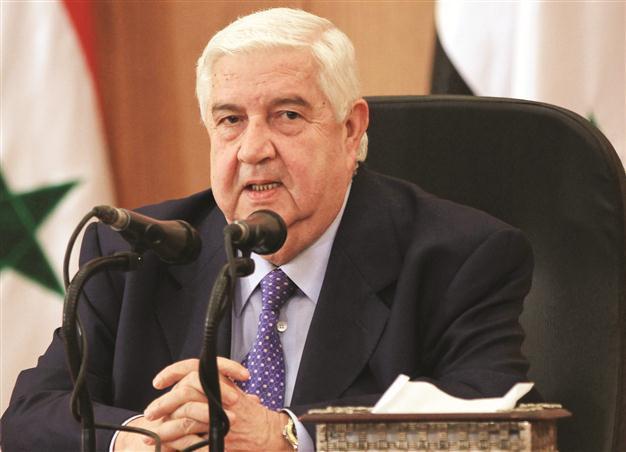Syria FM expects no Turkey intervention
Hande Aşık - DAMASCUS / CNNTürk

Syrian Foreign Minister Walid al-Muallem rejects humanitarian corridors. AFP Photo
Syrian Foreign Minister Walid al-Muallem has dismissed the possibility of a military intervention led by Turkey while also promising that the Arab republic would “resist” any invasion.In an interview yesterday with a group of reporters in Damascus, al-Muallem said Turkey was “suspicious” toward the Syrian government and that he blamed Ankara for being “a part of the plan” against Damascus.
The Syrian government will “resist a military intervention,” al-Muallem said following Feb. 26’s constitutional referendum, adding that he did not believe such military action would come from Turkey. “Frankly speaking, I do not see this [military intervention from Turkey] happening. I believe there is some wisdom left in Turkey,” he said, while also noting Turkey’s stance.
“[Before we can say anything], Turkey has suspicions. They are part of the plan against Syria,” al-Muallem said. “We listen to good advice, but that doesn’t mean you [can] put a timetable before us and we fulfill that. We fulfill [reform promises] according to the interest of the Syrian people.”
Al-Muallem urged Turkey not to take steps that might lose Syria in the end. “I don’t know what Turkish Foreign Minister Ahmet Davutoğlu meant by saying ‘All options are on the table,’ but what does the Turkish public have to gain from intervening in Syrian affairs?” he said. “My advice to Davutoğlu is that he should think twice before losing Syria forever.”
The minister also said, “As long as this policy continues against Syria I do not see a future for relations [with Turkey].”
Rejection of humanitarian corridors
As Western powers debate whether a humanitarian corridor should be established to provide aid to Syrian civilians, al-Muallem said the corridors would have military presence.
“Humanitarian corridors mean military corridors. You can’t have humanitarian corridors without military protection,” he said while blaming “insurgents” for the ongoing violence against the civilians.
The Syrian minister also criticized Ankara for hosting armed Syrian dissidents, rejecting the accusation that Syria responded to this policy by supporting the outlawed Kurdistan Workers’ Party (PKK).
“Turkey is hosting the Free Syrian Army and letting them move across the border. This is not good neighborly policy. But we are not treating Turkey similarly. We respect the Adana Protocol, the security agreement we have signed. The rumors that we are supporting the PKK are inaccurate,” al-Muallem said.
Lt. Col. Hussein al-Harmoush, who was captured by the Syrian forces after he defected from the Syrian military and fled to Turkey, was not captured on Turkish soil but in Idlib, the foreign minister said. A Turkish court recently ordered the arrest of an ex-member of the National Intelligence Organization (MİT) due to suspicions he “sold” al-Harmoush to Syria. The defector reportedly faces execution.
Al-Muallem said he had “no concrete information” about allegations that around 40 Turkish intelligence officers had been captured by Syrian forces.
The minister also alleged Turkish Prime Minister Recep Tayyip Erdoğan advised Damascus to engage in dialogue with the Muslim Brotherhood when he met with Syrian President Bashar al-Assad. “But we have a history about that party,” al-Muallem said. “Al-Assad has always said we will allow them to return to the country as individuals, but not as a party. This made Erdoğan unhappy.”
















